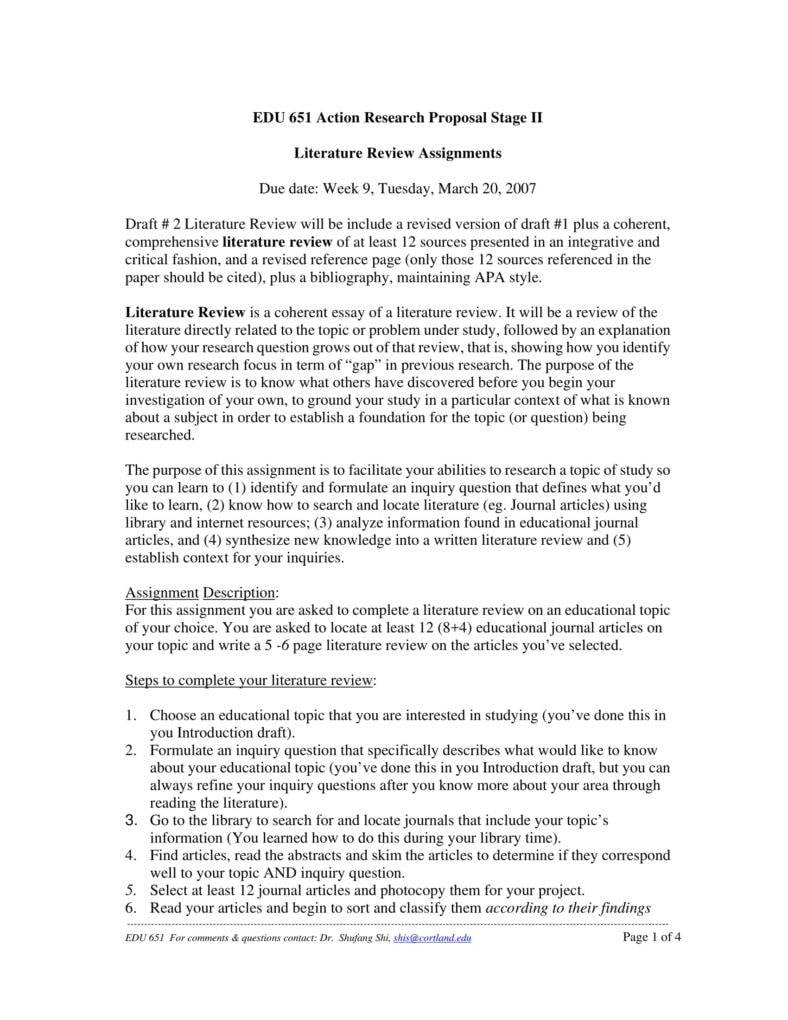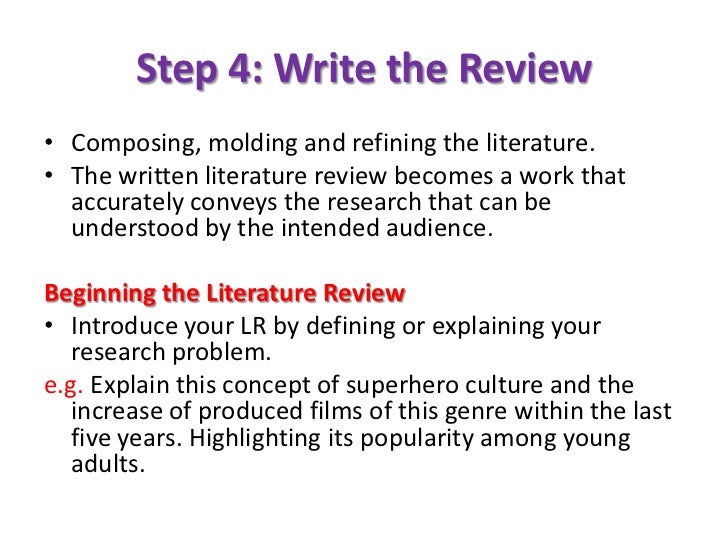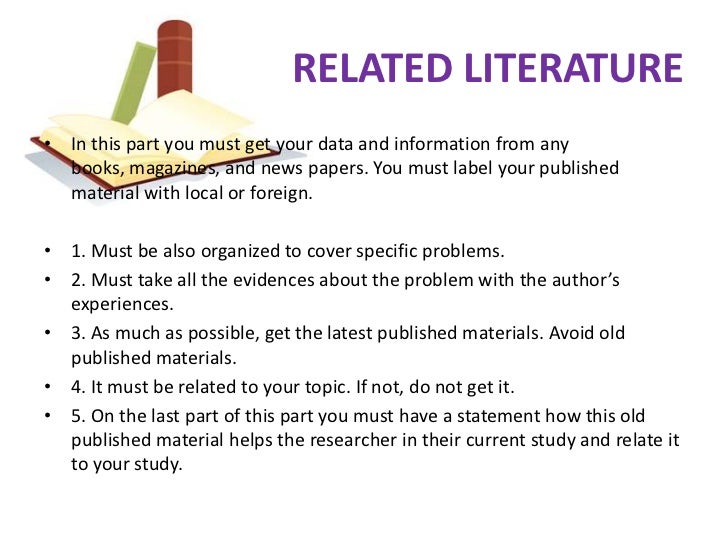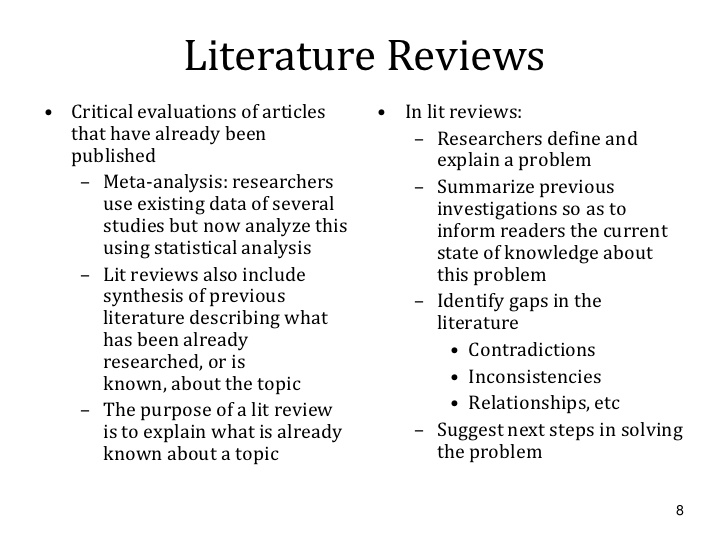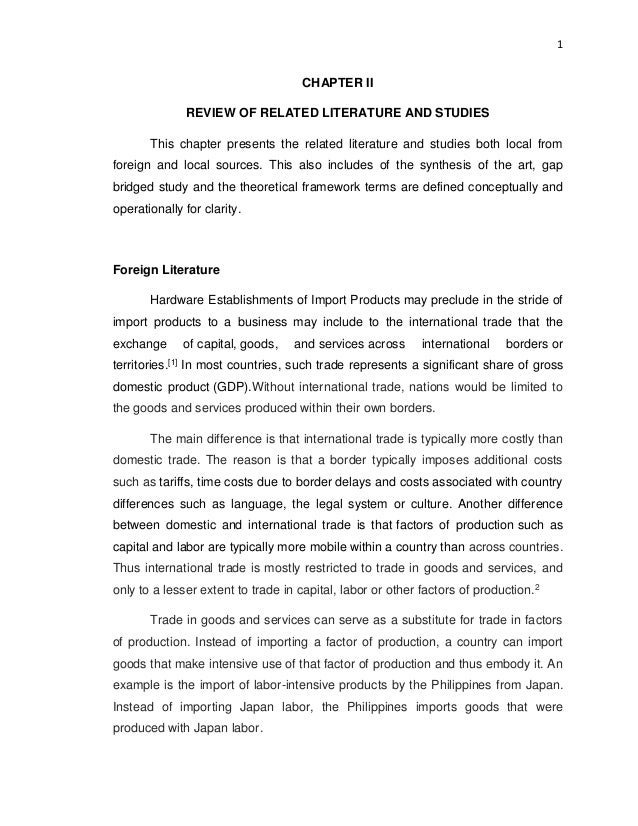A literature review is an overview of the previously published works on a specific topic. The term can refer to a full scholarly paper or a section of a scholarly work such as a book, or an article. Either way, a literature review is supposed to provide the researcher/author and the audiences with a general image of the existing knowledge on the topic under question. A good literature review can ensure that a proper research question has been asked and a proper theoretical framework and/or research methodology have been chosen. To be precise, a literature review serves to situate the current study within the body of the relevant literature and to provide context for the reader.
In such case, the review usually precedes the methodology and results sections of the work. Narrative or Traditional literature reviews critique and summarise a body of literature about the thesis topic. The literature is researched from the relevant databases and is generally very selective in the material used. The criteria for literature selection for a narrative review is not always made open to the reader.
These reviews are very useful in gathering and synthesising the literature located. Where a narrative approach differs from a systematic approach is in the notation of search methods criteria for selection,this can leave narrative reviews open to suggestions of bias. Such work is outside the scope of this article, which focuses on literature reviews to inform reports of original medical education research. We define such a literature review as a synthetic review and summary of what is known and unknown regarding the topic of a scholarly body of work, including the current work's place within the existing knowledge. While this type of literature review may not require the intensive search processes mandated by systematic reviews, it merits a thoughtful and rigorous approach.
Many researchers struggle when it comes to writing literature review for their research paper. A literature review is a comprehensive overview of all the knowledge available on a specific topic till date. Literature review is one of the pillars on which your research idea stands since it provides context, relevance, and background to the research problem you are exploring. The literature review is a written overview of major writings and other sources on a selected topic. Sources covered in the review may include scholarly journal articles, books, government reports, Web sites, etc.
The literature review provides a description, summary and evaluation of each source. It is usually presented as a distinct section of a graduate thesis or dissertation. Literature reviews are designed to provide an overview of sources you have explored while researching a particular topic and to demonstrate to your readers how your research fits within a larger field of study. Research tells a story and the existing literature helps us identify where we are in the story currently. It is up to those writing a dissertation to continue that story with new research and new perspectives but they must first be familiar with the story before they can move forward. Literature refers to a collection of published information/materials on a particular area of research or topic, such as books and journal articles of academic value.
However, your literature review does not need to be inclusive of every article and book that has been written on your topic because that will be too broad. Rather, it should include the key sources highlighting the main debates, trends and gaps in your specific research area. Scholarly booksare books written by researchers and practitioners mainly for use by other researchers and practitioners. Although edited volumes can also give a coherent presentation of the topic, it is not unusual for each chapter to take a different perspective or even for the authors of different chapters to openly disagree with each other.
In general, scholarly books undergo a peer review process similar to that used by professional journals. Figure 2.6 Small Sample of the Thousands of Professional Journals That Publish Research in Psychology and Related FieldsMost professional journals in psychology undergo a process ofdouble-blind peer review. Researchers who want to publish their work in the journal submit a manuscript to the editor—who is generally an established researcher too—who in turn sends it to two or three experts on the topic.
Each reviewer reads the manuscript, writes a critical but constructive review, and sends the review back to the editor along with his or her recommendations. The editor then decides whether to accept the article for publication, ask the authors to make changes and resubmit it for further consideration, or reject it outright. In any case, the editor forwards the reviewers' written comments to the researchers so that they can revise their manuscript accordingly. This entire process is double-blind, as the reviewers do not know the identity of the researcher, and vice versa.
Double-blind peer review is helpful because it ensures that the work meets basic standards of the field before it can enter the research literature. Knowledge production within the field of business research is accelerating at a tremendous speed while at the same time remaining fragmented and interdisciplinary. This makes it hard to keep up with state-of-the-art and to be at the forefront of research, as well as to assess the collective evidence in a particular area of business research. This is why the literature review as a research method is more relevant than ever. Traditional literature reviews often lack thoroughness and rigor and are conducted ad hoc, rather than following a specific methodology. Therefore, questions can be raised about the quality and trustworthiness of these types of reviews.
This paper discusses literature review as a methodology for conducting research and offers an overview of different types of reviews, as well as some guidelines to how to both conduct and evaluate a literature review paper. It also discusses common pitfalls and how to get literature reviews published. The purpose is to offer an overview of significant literature published on a topic. The level of detail or comprehensiveness of your literature review may depend on many things, but especially the purpose and audience of your review. Scholarly or academic peer-reviewed articles will often be a part of the research paper. An entire paper that is only a literature review is called a "review article" and they tell the reader the current state of understanding about a topic.
A literature review is a summary of the published work in a field of study. This can be a section of a larger paper or article, or can be the focus of an entire paper. Literature reviews show that you have examined the breadth of knowledge and can justify your thesis or research questions. They are also valuable tools for other researchers who need to find a summary of that field of knowledge.
Literature reviews provide you with a handy guide to a particular topic. If you have limited time to conduct research, literature reviews can give you an overview or act as a stepping stone. For professionals, they are useful reports that keep them up to date with what is current in the field. For scholars, the depth and breadth of the literature review emphasizes the credibility of the writer in his or her field. Literature reviews also provide a solid background for a research paper's investigation. Comprehensive knowledge of the literature of the field is essential to most research papers.
In addition, this type of literature review is usually much longer than the literature review introducing a study. At the end of the review is a conclusion that once again explicitly ties all of these works together to show how this analysis is itself a contribution to the literature. While it is not necessary to include the terms "Literature Review" or "Review of the Literature" in the title, many literature reviews do indicate the type of article in their title. Whether or not that is necessary or appropriate can also depend on the specific author instructions of the target journal.
Have a look at this article for more input on how to compile a stand-alone review article that is insightful and helpful for other researchers in your field. A literature review is a survey of scholarly sources on a specific topic. It provides an overview of current knowledge, allowing you to identify relevant theories, methods, and gaps in the existing research. You should also look for empirical research reports addressing your question or similar questions, which can give you ideas about how to operationally define your variables and collect your data.
As a general rule, it is good to use methods that others have already used successfully unless you have good reasons not to. Finally, you should look for sources that provide information that can help you argue for the interestingness of your research question. For a study on the effects of cell phone use on driving ability, for example, you might look for information about how widespread cell phone use is, how frequent and costly motor vehicle crashes are, and so on. The primary method used to search the research literature involves using one or more electronic databases. These include Academic Search Premier, JSTOR, and ProQuest for all academic disciplines, ERIC for education, and PubMed for medicine and related fields.
The most important for our purposes, however, is PsycINFO, which is produced by the APA. PsycINFO is so comprehensive—covering thousands of professional journals and scholarly books going back more than 100 years—that for most purposes its content is synonymous with the research literature in psychology. Like most such databases, PsycINFO is usually available through your university library. A systematic literature review identifies, selects and critically appraises research in order to answer a clearly formulated question (Dewey, A. & Drahota, A. 2016). The systematic review should follow a clearly defined protocol or plan where the criteria is clearly stated before the review is conducted. It is a comprehensive, transparent search conducted over multiple databases and grey literature that can be replicated and reproduced by other researchers.
Literature Review Definition In Research It involves planning a well thought out search strategy which has a specific focus or answers a defined question. The review identifies the type of information searched, critiqued and reported within known timeframes. The search terms, search strategies and limits all need to be included in the review.
To facilitate writing a literature review, journals are increasingly providing helpful features to guide authors. Additionally, many institutions have writing centers that provide web-based materials on writing a literature review, and some even have writing coaches. You've decided to focus your literature review on materials dealing with sperm whales. This is because you've just finished reading Moby Dick, and you wonder if that whale's portrayal is really real. You start with some articles about the physiology of sperm whales in biology journals written in the 1980's.
But these articles refer to some British biological studies performed on whales in the early 18th century. Literature reviews exist within different types of scholarly works. Short literature reviews can be presented in journal articles, book chapters, or coursework assignments to set the background of the research topic. Many search tools include options for viewing citations of selected articles.
Examining cited references provides additional articles for review and a sense of the influence of the selected article on its field. The purpose of a literature review is to provide a review of writings on the given topic in order to establish the reviewer's own position in the existing field of scholarship on that topic. A literature review provides a reader with a comprehensive look at previous discussions prior to the one the reviewer will be making in his/her own research paper, thesis, or dissertation. In short, a literature review shows readers where the reviewer is entering the academic conversation on a particular topic in the context of existing scholarship. A comprehensive approach requires the review of numerous sources (e.g. books and articles), which can be presented as a substantial chapter in a research thesis or published on its own as a scholarly article. A good literature review summarises, analyses, evaluates and synthesises the relevant literature within a particular field of research.
It illuminates how knowledge has evolved within the field, highlighting what has already been done, what is generally accepted, what is emerging and what is the current state of thinking on the topic. Additionally, literature reviews identify the gaps in the current knowledge - that is, uninvestigated or under-researched areas. Some disciplines require that you use information that is as current as possible. This is particularly true in disciplines in medicine and the sciences where research conducted becomes obsolete very quickly as new discoveries are made.
However, when writing a review in the social sciences, a survey of the history of the literature may be required. In other words, a complete understanding the research problem requires you to deliberately examine how knowledge and perspectives have changed over time. Sort through other current bibliographies or literature reviews in the field to get a sense of what your discipline expects. You can also use this method to explore what is considered by scholars to be a "hot topic" and what is not.
This is a difficult question because it depends on how extensively your topic has been studied and also on your own goals. One study found that across a variety of professional journals in psychology, the average number of sources cited per article was about 50 (Adair & Vohra, 2003). This gives a rough idea of what professional researchers consider to be adequate.
As a student, you might be assigned a much lower minimum number of references to use, but the principles for selecting the most useful ones remain the same. Key to your literature review is a critical analysis of the literature collected around your topic. The analysis will explore relationships, major themes, and any critical gaps in the research expressed in the work. Read and summarize each source with an eye toward analyzing authority, currency, coverage, methodology, and relationship to other works.
The University of Toronto's Writing Center provides a comprehensive list of questions you can use to analyze your sources. We have all been writing essays, critiques and literature reviews since junior high. These writing exercises prepared you to take on the task of writing a formal literature review, which you may have done as an undergraduate. A literature review, or lit review, is an account of what has been published on a topic by accredited scholars and researchers.
Often, a lit review is embedded as part of a larger essay or thesis or dissertation or it may stand on its own. This section differs slightly between reviews which are part of research articles and narrative reviews. The section describes the main conclusions from analysis of all the current studies and puts forth further avenues for research. This section requires critical interpretation by the author such that the review adds value to existing literature. It should bring out ideas/hypotheses that can explain any discrepancies and provide solutions to existing problems. A literature review, like a term paper, is usually organized around ideas, not the sources themselves as an annotated bibliography would be organized.
This means that you will not just simply list your sources and go into detail about each one of them, one at a time. As you read widely but selectively in your topic area, consider instead what themes or issues connect your sources together. How well do they present the material and do they portray it according to an appropriate theory? Pick one of these themes to focus the organization of your review. These literature reviews are generally a bit broader in scope and can extend further back in time.
This means that sometimes a scientific literature review can be highly theoretical, in addition to focusing on specific methods and outcomes of previous studies. In addition, all of its sections refer to the literature rather than detailing a current study. The literature review found at the beginning of a journal article is used to introduce research related to the specific study and is found in the Introduction section, usually near the end. It is shorter than a stand-alone review because it must limit its scope to very specific studies and theories that are directly relevant to this study. Its purpose is to set research precedence and provide support for the study's theory, methods, results, and/or conclusions.
Not all research articles contain an explicit review of the literature, but many do, whether it is a discrete section or indistinguishable from the rest of the Introduction. In a larger piece of written work, such as a dissertation or project, a literature review is usually one of the first tasks carried out after deciding on a topic. Reading combined with critical analysis can help to refine a topic and frame research questions. A literature review establishes familiarity with and understanding of current research in a particular field before carrying out a new investigation. Conducting a literature review should enable you to find out what research has already been done and identify what is unknown within your topic.
First, it is best to focus on recent research, keeping in mind that what counts as recent depends on the topic. For newer topics that are actively being studied, "recent" might mean published in the past year or two. For older topics that are receiving less attention right now, "recent" might mean within the past 10 years. You will get a feel for what counts as recent for your topic when you start your literature search. A good general rule, however, is to start with sources published in the past five years. The main exception to this rule would be classic articles that turn up in the reference list of nearly every other source.






